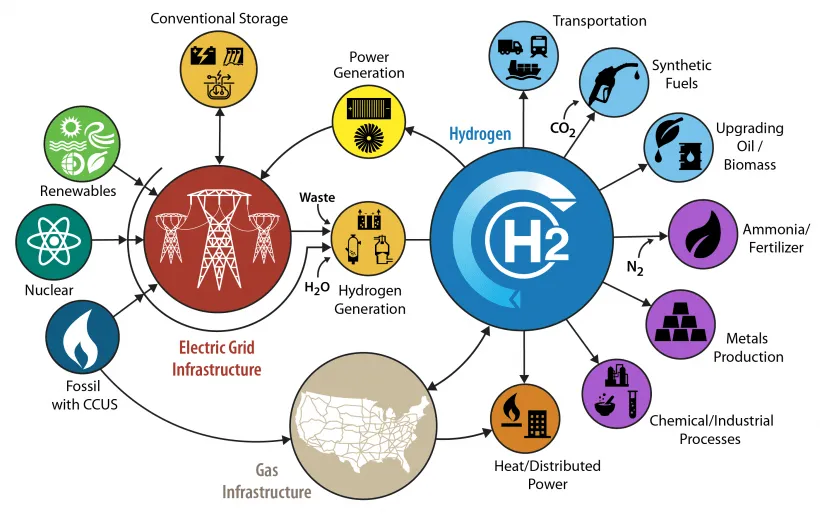
Hydrogen is an important energy carrier that can play a key role in reducing carbon emissions from heavy-duty vehicles and aviation, heating and distributed power, and industrial applications like steelmaking, glassmaking and semiconductor manufacturing. There is growing interest around wider adoption of hydrogen and its potential economic and environmental benefits. The potential for hydrogen to serve as a clean, economical energy carrier has generated increased momentum federally, highlighted by a recent commitment from the Department of Energy to invest $7 billion toward the creation of six to 10 regional hubs designed to accelerate the deployment of hydrogen across the U.S. The University of Michigan has launched a new initiative to support and catalyze multidisciplinary research involving the universe’s lightest and most abundant element.
MI Hydrogen, a joint venture by the Office of the Vice President for Research, Michigan Engineering, the School for Environment and Sustainability will foster collaboration among U-M researchers, community groups, government and industry partners so they can address existing knowledge gaps and develop strategies to help society transition toward an energy future that is equitable, affordable, clean and secure.
For hydrogen to be deployed in the U.S. broadly, key advances in technology must be created and demonstrated, along with support and alignment of economic and public policy drivers, and societal acceptance. The University of Michigan is well positioned to catalyze a hydrogen transition, given our expertise across all of these areas, and together as a research community, we can critically assess hydrogen solutions against incumbent and alternative technologies.
Based on input from U-M units around the proposed design and direction for the initiative,
MI Hydrogen will launch a set of new research projects focused on transportation and industrial applications. Teams also will be working together to analyze the potential statewide demand for hydrogen and develop a framework for hydrogen ecosystem planning and implementation. MI Hydrogen builds upon the Hydrogen Roadmap for the State of Michigan Workshop hosted last spring at U-M, which brought together stakeholders from academia, industry and government, and led to a report published by the Center for Sustainable Systems.
MI Hydrogen will be based in the Office of the Vice President for Research, and it is part of the university’s new Institute for Energy Solutions; the Center for Sustainable Systems will play a lead role in the effort. Professors Greg Keoleian and Todd Allen will serve as co-directors for
MI Hydrogen as U-M plays a pivotal role in accelerating society’s transition toward clean energy. CSS researchers who are actively engaged with the MI Hydrogen initiative include: Michael Craig, Geoff Lewis, Josh Newell, Parth Vaishanv and Tim Wallington.
Projects
-
Hydrogen Demand Analysis for the State of Michigan
-
Critical Review: Role for Hydrogen in Sustainable Transportation
-
Critical Review: Role for Hydrogen in Decarbonizing the Industrial Sector
-
Planning a Hydrogen Ecosystem (Production, Delivery, Storage and End-Use Applications): Michigan/Great Lakes Region Case Analysis
Please visit https://research.umich.edu/mi-hydrogen/ to learn more about MI Hydrogen.